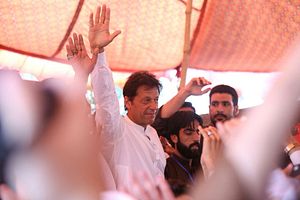Last week’s suicide bombing in Parachinar, the capital of Kurram Agency in Pakistan’s tribal areas, killed more than 50 people. Mainly, the attack targeted the city’s Shia population and was claimed by the Lashkar-e-Jhangvi (LeJ), a banned sectarian organization that has long remained engaged in militant activities against the country’s minority populations.
While the government has been unable to contain LeJ, which has emerged as the only major militant outfit that continues to defy Pakistan’s country terrorism efforts, the state’s policy to deal with the country’s sectarian challenge still remains reactive and knee-jerk.
Moreover, on the part of the ruling civilian elite, the politicization of sectarian militancy has emerged as a novel approach to push back against voices that demand swift and comprehensive action against all sorts of sectarian challenges in the country. It has become a common ploy on the part of the ruling civilian elite that whenever victims of sectarian militancy, which in the current case is the Shia population of Parachinar, protest and demand action against perpetrators, the government comes out with calls and requesters of not dividing the country on religious and ethnic lines. It’s ironic that rather than talking about possible policy changes to deal with the challenge, the government lambasted the protesters, social media activists and civil society by indirectly alleging that they are part of a foreign agenda to divide the country.
The dilemma in this regard continues to cling with the ruling elite’s perpetual denial that ongoing sectarian militancy in Pakistan is due to some international conspiracy, which is part of a broader design to weaker or destabilize the country. Seen in this context, the mere protests and democratic demands of the masses are considered unpatriotic activities by the government. They are seen as being only afoot to serve Pakistan’s enemies.
It took the country’s prime minister and his team one week to decide that offering 1 million rupees as compensation to the families of the Parachinar suicide bombing was the best possible action or solution that the state could offer. The prime minister’s tactic of offering financial compensation to alleviate the pain of the victims’ families only further alienated the protesters: “we need to be recognized as human beings first,” said the victims’ families.
If one is to believe that civil society protests in the wake of a militant attack divide the country on religious and ethnic lines then what does the government’s policy of inaction achieve when it only responds to killings by simply offering financial compensation or lambasting their complaints by terming them anti-national?
There have not been any renewed calls to take on all sorts of sectarian challenges that continue to shatter Pakistan’s growing confidence to tackle militancy in the country. Clearly, the government doesn’t see the ongoing sectarian militancy and religious division that it has caused as part of Pakistan’s terrorism problem.
A few months ago, the country’s interior minister, Chaudhry Nisar, in a statement said that “banned sectarian organizations could not be equated with other banned terrorist organizations.” While both types of organizations continue to kill innocent people in the country, the government has been working on finding ways to differentiate and define killings.
If sectarian organizations are not terrorist organizations then why thousands of civilians have been killed in sectarian violence?
Imran Khan, the head of the Pakistan Tehreek-e-Insaf (PTI) was the only major political leader that traveled to the city to meet the grieving protesters. Even Khan, while addressing the protesters in Parachinar, didn’t talk about domestic reasons and factors that need to be tackled to contain sectarian militancy in the country.
In fact, Khan, during his brief stay in the city, only talked about an “international conspiracy” that was afoot to divide Pakistan by exploiting the country’s diverse religious, cultural, and ethnic differences. In a way, Khan implied that the mere act of protesting and initiating debate on the sectarian militancy amounts to playing into the hands of mysterious forces that want to see bloodshed and disharmony in Pakistan.
What is unfortunate is that Pakistan’s ruling elite remains indifferent to growing sectarian challenges in the country. On the part of the state, the only efforts in this regard deal with the government’s consistent effort to sideline voices that ask for actions and policy changes in Pakistan’s approach to deal with sectarian threats in the country.
Unless the fundamental drivers of sectarian militancy, which primarily originate in Pakistan’s domestic environment, are not tackled and addressed, instability will continue to haunt the country.

































